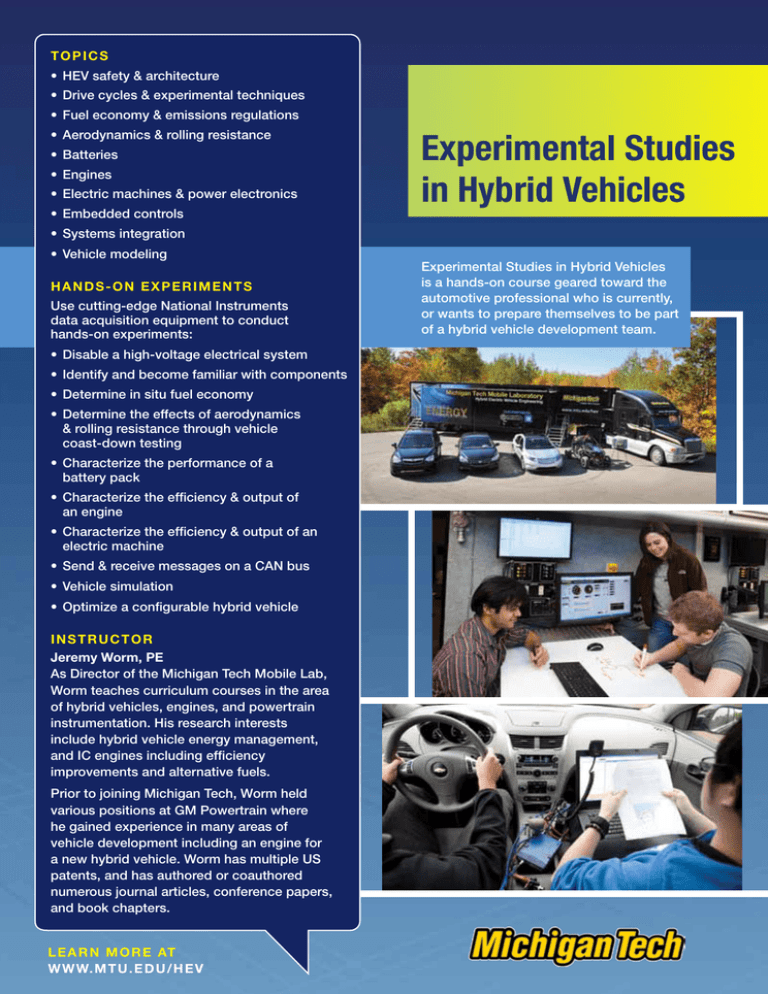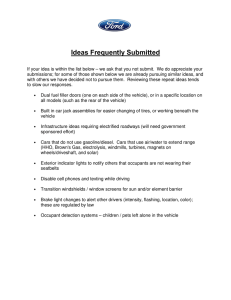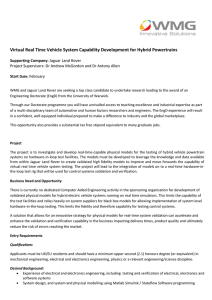• HEV safety & architecture topics
advertisement

Topics • HEV safety & architecture • Drive cycles & experimental techniques • Fuel economy & emissions regulations • Aerodynamics & rolling resistance • Batteries • Engines • Electric machines & power electronics • Embedded controls Experimental Studies in Hybrid Vehicles • Systems integration • Vehicle modeling Hands-on Experiments Use cutting-edge National Instruments data acquisition equipment to conduct hands-on experiments: • Disable a high-voltage electrical system • Identify and become familiar with components • Determine in situ fuel economy • Determine the effects of aerodynamics & rolling resistance through vehicle coast-down testing • Characterize the performance of a battery pack • Characterize the efficiency & output of an engine • Characterize the efficiency & output of an electric machine • Send & receive messages on a CAN bus • Vehicle simulation • Optimize a configurable hybrid vehicle Instructor Jeremy Worm, PE As Director of the Michigan Tech Mobile Lab, Worm teaches curriculum courses in the area of hybrid vehicles, engines, and powertrain instrumentation. His research interests include hybrid vehicle energy management, and IC engines including efficiency improvements and alternative fuels. Prior to joining Michigan Tech, Worm held various positions at GM Powertrain where he gained experience in many areas of vehicle development including an engine for a new hybrid vehicle. Worm has multiple US patents, and has authored or coauthored numerous journal articles, conference papers, and book chapters. L e a r n m o r e at w w w. m t u . e d u / h e v Experimental Studies in Hybrid Vehicles is a hands-on course geared toward the automotive professional who is currently, or wants to prepare themselves to be part of a hybrid vehicle development team. Experimental Studies in Hybrid Vehicles Course Description Vehicle powertrain hybridization is a critical step on the pathway to sustainable transportation. Hybrid powertrain systems are able to realize improvements in efficiency through strategic energy management principals. Although effective, these systems bring a significant degree of complexity to the vehicle development process, and engineers must be familiar with the operation of systems outside their core area of expertise. This introductory course treats the vehicle as a series of energy conversion processes. The course will rely on a mix of lecture, hands-on experimentation using production and one-half scale configurable Hybrid Vehicles and a complete powertrain test cell. Participants will learn the basic operating principals governing all major hybrid vehicle subsystems before using commercial vehicle modeling software and an operational vehicle property to optimize the performance of a configurable hybrid electric vehicle. Learning Objectives 1.Understand the energy conversion processes and energy flow through a hybrid electric vehicle 2.Understand the basic operating principals of Hybrid Electric Vehicles and their subcomponents, especially their impact on the energy conversion process 3.Be able to interface with engineers across various disciplines on a hybrid vehicle development team 4.Understand typical experimental techniques and apparatus used in vehicle development 5.Become familiar with vehicle simulation and correlation to experimental data Audience This course is intended for engineers new to the hybrid vehicle field, those wishing to enter the hybrid vehicle field, or experienced hybrid vehicle engineers wishing to learn more about other areas of the hybrid vehicle outside their area of expertise. The course is also appropriate for managers and technicians wishing to expand their knowledge of hybrid vehicles. Prerequisites L e a r n m o r e at w w w. m t u . e d u / h e v An engineering degree, or exposure to thermodynamics, a basic understanding of electronic data acquisition, and the ability to solve closed-form equations.



